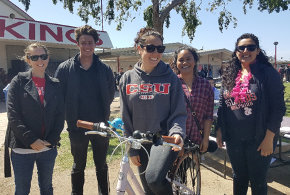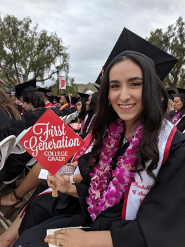CSUCI current student learning assessments have focused on inclusive excellence, retention, and graduation.
A highlight of CSUCI's COVID-19 Response to Assessment in Chemistry
Read more about our response in Chemistry.
Student Learning Assessments on Inclusive Excellence
Textbook Affordability "Drawing upon more than 700 undergraduate surveys [at CSUCI], our [statistical analyses] revealed textbook costs to be a substantial barrier for the vast majority of students. However, those barriers were even more significant among historically underserved..." researched published by Jacob Jenkins (Communication), Luis Sanchez (Sociology), Megan Schraedley, Jaime Hannans (Nursing), Nitzan Navick, & Jade Young. Read the full article on Textbook Affordability.
"Drawing upon more than 700 undergraduate surveys [at CSUCI], our [statistical analyses] revealed textbook costs to be a substantial barrier for the vast majority of students. However, those barriers were even more significant among historically underserved..." researched published by Jacob Jenkins (Communication), Luis Sanchez (Sociology), Megan Schraedley, Jaime Hannans (Nursing), Nitzan Navick, & Jade Young. Read the full article on Textbook Affordability.
The OpenCI initiative at CSUCI led by Jaime Hannans and Jacob Jenkins promotes the use of no cost course materials at CUSCI and has saved over $1 million to prevent barriers for all students, especially those from historically underserved backgrounds.
Disability Inclusion
A student, Jessica Clay, inspired faculty and staff to assess new dimensions of including people with disabilities in academics.
With the guidance of Acting Director of the Santa Rosa Island Research Station, Robyn Shea, Jessica Clay was the first person who uses a wheelchair to visit the Research Station. Robyn and Jessica assessed the accessibility and inclusiveness of boat transport to the island as well as on the island at the Research Station.
Associate Professor, Heather Castillo, assessed the accessibility and inclusiveness of dance courses and Arts Under the Stars, a multimedia performance. Read more about Jessica's experience and research on Disability Inclusion.
Embedded Tutors
 The Martin V. Smith School of Business and Economics recognized high DFW rates in certain classes and designed an intervention in which tutors of are embedded in class time to improve student success.
The Martin V. Smith School of Business and Economics recognized high DFW rates in certain classes and designed an intervention in which tutors of are embedded in class time to improve student success.
A pilot of the embedded tutors program has begun in a Finance course. Preliminary data shows (even with the shift to virtual instruction due to COVID-19) a significant increase in the number of students enrolled in FIN 300 who “visited” the Learning Resource Center on campus during the pilot (43%), as compared to Fall 2019 (28%) and Spring 2019 (26%).
Retention and Graduation Assessments
Learning Communities
Undergraduate first year CSUCI students who take UNIV 150 First Year Seminar, are in the Equal Opportunity Program, and other students are required to or may voluntarily join a learning community on campus. In learning communities an embedded peer mentor meets with students outside of class every other week to support students to transition to university life. Data from full-time freshman from Fall 2011 through Fall 2018 cohorts  were used to assess the effect of participating in learning communities on retention and grades by Leslie Abell and Kristin Jordan. Regression analyses and propensity score matching were used to control for other factors. Analyses found that students that participated in a learning community experienced statistically significant increases in first year retention, GPA, and total units attempted in the first year and decreases in failing or withdrawing from a course in the first term. A full report was provided to all faculty to improve advising students to participate in learning communities.
were used to assess the effect of participating in learning communities on retention and grades by Leslie Abell and Kristin Jordan. Regression analyses and propensity score matching were used to control for other factors. Analyses found that students that participated in a learning community experienced statistically significant increases in first year retention, GPA, and total units attempted in the first year and decreases in failing or withdrawing from a course in the first term. A full report was provided to all faculty to improve advising students to participate in learning communities.
STEM Graduation Rates
 CSU Student Success Dashboard Data was used to assess STEM graduation rates. Blake Gillespie and many other STEM faculty reported that 51% of Latinx STEM students failed to complete their degrees in six years, compared to 38% of white students. High DFW rates in STEM impacted students disproportionately as well. For example, 27% of Latinx students received a DFW in BIOL200, while 10.7% of white students received a DFW. As a result of this assessment, collaboration of STEM programs implemented interventions for math anxiety, text anxiety, and sense of belonging to improve graduation and DFW rates in STEM among Latinx students.
CSU Student Success Dashboard Data was used to assess STEM graduation rates. Blake Gillespie and many other STEM faculty reported that 51% of Latinx STEM students failed to complete their degrees in six years, compared to 38% of white students. High DFW rates in STEM impacted students disproportionately as well. For example, 27% of Latinx students received a DFW in BIOL200, while 10.7% of white students received a DFW. As a result of this assessment, collaboration of STEM programs implemented interventions for math anxiety, text anxiety, and sense of belonging to improve graduation and DFW rates in STEM among Latinx students.
1:1 Faculty Advising for Students
 CSUCI Program Dashboard Data was used to assess the graduation and retention rates before and after implementing 1:1 faculty advising within the major in Health Science, one of the largest majors at CSUCI. Prior to implementing 1:1 advising, students were only provided advising in groups for Health Science-related advising. The report found that retention and graduation rates in Health Science improved after implementing individual 1:1 advising in the major. Additionally, it showed that Historically Underrepresented Groups (HUGs) had similar retention and graduation rates as non-HUGs in Health Science.
CSUCI Program Dashboard Data was used to assess the graduation and retention rates before and after implementing 1:1 faculty advising within the major in Health Science, one of the largest majors at CSUCI. Prior to implementing 1:1 advising, students were only provided advising in groups for Health Science-related advising. The report found that retention and graduation rates in Health Science improved after implementing individual 1:1 advising in the major. Additionally, it showed that Historically Underrepresented Groups (HUGs) had similar retention and graduation rates as non-HUGs in Health Science.

